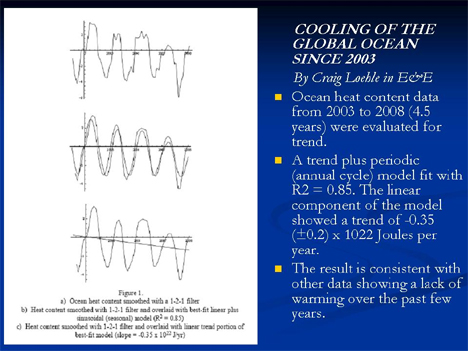The Ocean Really Is Cooling
by Jennifer Marohasy, jennifermarohasy.com, March 21st, 2009 [here]
THERE are 3,000 free-drifting buoys in the world’s ocean; first deployed in the year 2000 they allow continuous monitoring of the temperature, salinity, and velocity of the upper ocean.
There has though been some difficulty in interpreting the data from these buoys. Initial signs of cooling were dismissed as due to technical errors subsequently corrected based on a small sample of the 3,000 buoys known as profiling floats.
Craig Loehle has analysed the data from only the profiling floats for ocean heat content from 2003 to 2008. In a paper recently published in the journal Energy and Environment he has concluded that there has been ocean cooling over this period.
This graphic is from figure 1 of the technical paper and shows the decline in ocean heat content (x1022J) smoothed with a 1-2-1 filter.

Dr Loehle’s findings are consistent with satellite and surface instrumental records that do not showing a warming trend over recent years.
Notes:
1. Craig Loehle is a senior scientist at the Illinois-based ‘National Council for Air and Stream Improvement’.
2. Cooling of the global ocean since 2003. Craig Loehle, 2009. Energy and Environment. Volume 20.
3. Argo (free-floating buoys) Homepage [here]
4. Apologies to Josh Willis: Correcting Global Cooling (Part 3) [here]
5. Correcting Ocean Cooling: NASA Changes Data to Fit the Models Adjusts Data from Buoys [here]
6. Global Warming’s Missing Heat [here]
The observed absence of heat accumulation (of Joules) in the upper ocean (and in the troposphere) for the last four years means that there has been NO global warming in these climate metrics during this time period. It is unknown whether this is a short term aberration but, regardless, it is clear that the IPCC models have failed to skillfully predict this absence of warming.
7. Dr. Jennifer Marohasy, Ph.D., is an Australian biologist [here]. Her blog has been called:
[T]he best enviro community blog, if not on the planet, then certainly in the Southern Hemisphere. This small free marketplace of ideas that Jen has created is an environment where concepts wrestle fiercely, while silent but curious minds, (surely the vast majority of visitors here) naturally select the fittest for survival. — Wes George [here].
by bear bait
bear — note the map in the post [here].
The colors indicate the temperature anomaly; that is, the deviation from average for that quadrant of ocean. That’s much different than the absolute temps. Equatorial (surface) waters are much warmer than Arctic (surface) waters, even though they both might have the same map color. The colors are the same because in both places the deviation from average is the same (both may be 2 degrees below average, for their respective locations, for instance).
Post the link to the map you’re following. It sounds interesting, and we can determine whether the absolute temps or the anomalies are shown. I’m guessing it will be the anomalies.

I follow a web site that tracks gps equipped animals in the Pacific…blue whales, salmon shark, white sharks, albatross of differing species, and other pinnipeds. So I have noticed this winter a shot of cold surface water that runs west from the Isthmus of Panama to almost the Solomon Islands. Warmer water on either side, and the temps are color coded, indicating that this slice of cooler water is about the same temp as water off San Diego and the east coast of Japan towards the Gulf of Alaska. And the same temp is apparent along the WestCoast of Chile and up to Peru, in what I guess is the Humboldt Current….the cold upwelling that serves the fisheries of Chile.
I would have expect the water just north of the Equator would have been the warmest, and it is in the Atlantic. But in the Eastern Pacific, it is a long pool of cooler water on the surface. I have no idea what I have been looking at, but someone a lot smarter than me who reads this will tell us, I hope.